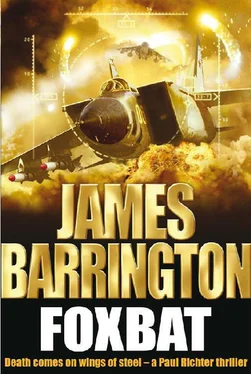It was nearly three hours after his inspection team had assembled in the squadron office, their bags beside them, that the Antonov was finally towed out of the maintenance hangar and chocked on the hardstanding in front of them.
‘At last,’ Yershenko muttered, as he watched the fuel bowser approach.
Fifteen minutes later, he strapped himself into his seat at the front of the cabin and opened his briefcase. His inspection report was far from finished, and he proposed to use this long flight to continue drafting the final document. And it wouldn’t just be a single hop: the Antonov was a slow aircraft with a very limited range, so would have to land and refuel at least three times before reaching the Ukraine.
The aircraft levelled at ten thousand feet and the pilot relaxed, trimmed the Antonov for straight and level flight, and then picked up an en-route chart to work out an updated estimate for the next military airfield they’d be landing at to replenish their tanks.
In the passenger cabin behind him, Yershenko continued with his report while most of his team opened the packs of sandwiches they’d been given on departing Letneozerskiy. The Antonov didn’t run to a galley – even the chemical toilet was very much an afterthought – so any food and drink had to be carried on board.
Twenty minutes after reaching its cruising altitude, there was a muted thud somewhere near the main radio set. It sounded almost like a bird-strike, so at first the pilot was relatively unconcerned. Just as a precaution, he tried calling the Letneozerskiy radar controller, but found the set was dead.
Loss of the main radio was an irritation rather than a serious problem, but it still remained a matter of concern. Thirty seconds later concern changed to worry when the pilot realized that the standby radio was also non-functioning. There were emergency procedures for this kind of situation, and obviously they would have to land as soon as possible to get the radios fixed. The pilot consulted his en-route chart, calculating times and distances, then selected cabin broadcast to tell his passengers what had happened, and explain what he intended to do.
But the words never formed, for at that instant there was a colossal explosion somewhere in the lower section of the fuselage. The cabin floor erupted upwards, the detonation peeling the aircraft apart, twisting and severing pipes and wires, and scattering seats, boxes, cases and aluminium panels alike. Most of the team had removed their seatbelts and were now catapulted instantly from the falling wreckage. Mercifully for them, most were killed or knocked unconscious by the force of the explosion. The pilot was flung forward through the windscreen and was dead even before he started falling.
But Yershenko remained conscious all the way down and, in the last moments of his life, understood exactly why there’d been such a delay in refuelling at Letneozerskiy.
It doesn’t take long to plummet ten thousand feet, and in just over a minute what was left of the An-28 and its human cargo impacted the frozen and unyielding ground at around two hundred miles an hour.
Back in the air traffic control room at Letneozerskiy, a senior officer advised the station commander that the Antonov had disappeared from the radar screen, with its pilot no longer responding to radio calls. The commanding officer ordered him to initiate a search and rescue operation immediately, then phoned each of the squadron commanders in turn to brief them on the apparent loss of an aircraft.
However deeply concerned the 524 IAP colonel sounded, he had already begun preparing himself for a long and completely unauthorized journey of his own that would take him first to a private bank in Austria, and eventually to somewhere agreeable in southern Europe, perhaps on the Mediterranean coast of Spain.
Tuesday
Dobric Air Base, Bulgaria
Dobric Air Base near Varna had been ‘inactive’ since the millennium, but there are degrees of inactivity and, despite the fact that no aircraft flew to or from the base, there were always armed guards on duty there. This was because Dobric had become one of Bulgaria’s largest repositories of reserve planes, aircraft stores and munitions.
Deliveries and collections were frequent, but these were always carefully pre-notified to ensure that sufficient staff were on hand to assist with the loading and unloading. So when a trio of unmarked three-ton trucks pulled up outside the locked main gates, the guard in the concrete security post at first more or less ignored them because no such movements had been scheduled for that day.
He watched with greater interest though when two men wearing Bulgarian Air Force uniforms climbed down from the lead vehicle and walked over to the security post, arguing loudly. Reassured by the sight of the familiar uniforms, the guard didn’t think to pick up the assault rifle leaning against the wall beside him. Behind him, a small and cheap TV set blared out a current pop song, while professional dancers writhed unenthusiastically on the black-and-white screen.
One of the arrivals, who was using the name Draco, nodded to the guard and slid a folded sheet of paper through the slot under the window. The Bulgarian took it, expecting to find the address or location they were looking for but, on unfolding it, found it completely blank. He looked up in puzzled surprise to see the man smiling slightly.
The next thing he registered was the muzzle of a silenced pistol levelled at him through the slot. Before the guard could react, there came a sound like a cough, and he fell backwards, shot directly through the heart.
Immediately, the second man jogged over to the main gates and studied them carefully. Even if not electrified, some kind of an alarm system might have been expected, but he saw nothing there to cause him concern. That meant all they had to do now was find the key and get inside.
Typical of military establishments the world over, each gate comprised a ten-foot steel frame with cross-braces, and diamond-pattern wire mesh secured to it. He could have easily cut through this, but it was just as quick to climb over.
Grasping the wire with his gloved hands, he pulled himself up, jamming the toes of his boots periodically into the mesh, feeling for the firmer frame and cross-braces behind it. In less than ten seconds he was astride the gate, and fifteen seconds after that was standing outside the door of the security post, trying the handle.
As expected, the door was locked, so he reached down to his equipment belt and removed a crowbar from one loop. Then he forced the end of it into the gap around the door and pulled hard. The wood splintered, but held, so he changed position slightly and levered again. This time the door creaked loudly, then flew open. He stepped inside.
Ignoring the sprawled body of the dead guard, the intruder strode across to the open key safe bolted to the wall. Inside, there were probably a couple of dozen sets of keys hanging on labelled hooks, but he knew exactly which ones he needed. He chose two sets and headed back to the main gates. Inserting one key in the lock, he pulled the double gates open wide.
The moment he did so, the three trucks started up and drove inside the base. At this point he stepped up to the leading vehicle and handed over the second set of keys to Draco, who’d meanwhile returned to his cab. After that he closed and relocked the main gates. As the threetonners drove away towards the storage buildings, the first intruder started a perfunctory clean-up operation in the security post, by dragging the guard’s corpse out of sight of the window.
Deep inside the Dobric complex, the three trucks stopped outside a likely-looking building while the driver checked the number painted on its wall. He shook his head and they drove to the next one. There he swung the truck in a wide turn so that he could reverse close up to the doors.
Читать дальше












